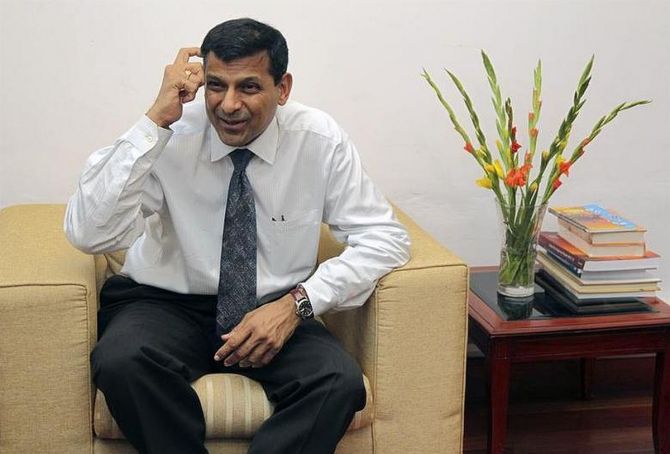Observing that it is not yet clear to him what the government means by 'Atmanirbhar Bharat', Rajan said if it is about creating an environment for production, then it is a re-branding of the Make in India initiative.

Former Reserve Bank governor Raghuram Rajan on Wednesday said the 'Atmanirbhar Bharat' campaign of the government should not result in protectionism, adding that such policies had not worked in the past.
Observing that it is not yet clear to him what the government means by 'Atmanirbhar Bharat', Rajan said if it is about creating an environment for production, then it is a re-branding of the Make in India initiative.
"If it is about protectionism, unfortunately India has raised tariffs recently, (then) it does not make any sense to my mind to go that way because we tried that before.
"We had a licence permit raj earlier...that protectionism was problematic, it enriched a few corporations but basically was a source of poverty for many of us," he said.
Rajan was addressing a virtual event organised by economic think tank ICRIER.
"When we talk about Atmanirbhar Bharat, I am not quite sure which side is being emphasised.
“If it is, let's create an environment for production, I think that makes a lot of sense and it basically reiterates Make in India and rebrands...Make in India," he said.
Rajan, currently a professor at the University of Chicago, further said India needs world-class manufacturing and that means the country's manufacturers have access to cheap imports, which form the basis for strong exports.
"So, by all means, we need to create infrastructural support, logistic support etc for being part of the global supply chain.
“But let us not create a tariff war because we know that does not work, many countries have tried it," the eminent economist noted.
He also stressed that India needs to work very hard on its education sector.
"We can provide education across the borders," he added.
Replying to a question, Rajan said India may require a different institutional mechanism for reviving firms hit by the COVID-19 pandemic.
"I think each country has to figure out for itself whether the existing structures are right," he pointed out.
Rajan said countries like India should also see if the current institutional mechanisms for restructuring are the right ones for the problems created by the pandemic.
"As I said before, typically you reach distress when you have mismanaged.
"In the pandemic, you may reach distress either because you started with the wrong capital structure or because your business was locked down for four months and you had no option, but you may be a viable good business, and to let you go out of business may be a bad thing at this point," he said.
To a query on monetisation of deficit by the RBI, he said there is a magical belief that somehow central banks can finance when the government does not have access to financing.
"What central banks can do is in the very short run use their balance sheet to intermediate between banks, and the government.
"So if the government needs to place a lot of government paper in the short run, the central bank can absorb it on its balance sheet," he said.
Rajan further said what really matters is the quality of country's finances.
"In India's case it would be, for example, adopt a debt target and put in place legislation which shows that you will move towards the debt target.
"Appoint that independent fiscal commission which will look at the budgets and talk about where there is a lack of transparency and perhaps you're actually hiding the true fiscal position," the former RBI governor said.
Monetisation of deficit happens when the central bank directly buys government securities from the primary market and in turn prints more money, thereby helping bridge the fiscal deficit.
Photograph: B Mathur/Reuters










